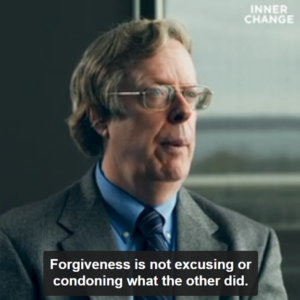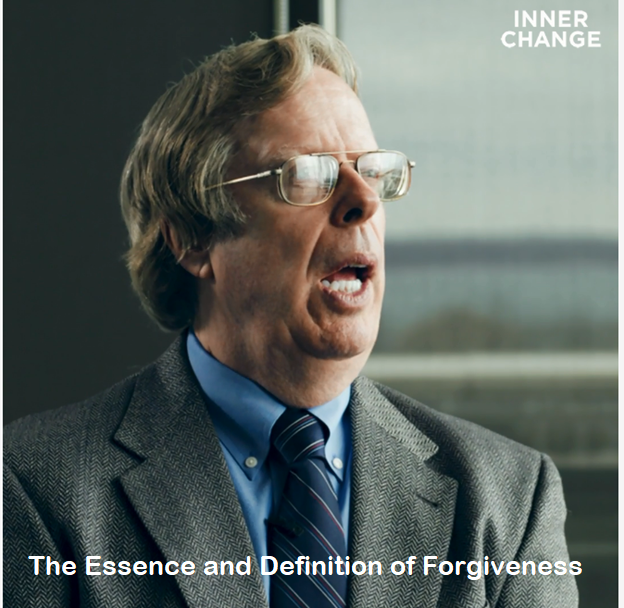Tagged: “definition of forgiveness”
This is what forgiveness is not. . .
A newly-released video interview with forgiveness expert Dr. Robert Enright called “This is what forgiveness is not” is now available to view at no cost on the website Inner Change.
The 3 min. 22 sec. video was recorded by a film production studio based in Switzerland that has cinematic staff in the US and more than a dozen other countries around the world. It is one of 13 short video segments that Inner Change has recorded with Dr. Enright and which it will release over a 2-year period. Thus far, five of the Dr. Enright interviews have been made available:

Dr. Robert Enright, founder of the International Forgiveness Institute.
- This is what forgiveness is not – Dr. Enright outlines four aspects of what forgiveness is not:
- It is not excusing or condoning.
- It is not forgetting but remembering in new ways.
- It does not necessarily mean reconciliation although it could happen if the other becomes trustworthy.
- When you forgive, you do not throw justice away, you bring it alongside.
- The Essence and Definition of Forgiveness (2 min. 15 sec.) – In this interview, Dr. Enright defines forgiveness from an interdisciplinary, cross-cultural, and interfaith perspective that basically includes what Socrates would call the “essence” or “core” of forgiveness.
. - How I Became Involved in Forgiveness Studies (4 min. 16 sec.) – Dr. Enright explains how after years of studying moral development at the behest of his employer, the University of Wisconsin-Madison, he asked himself, “What might make a difference in the world in people’s lives?” The answer he came up with in 1985 was “the virtue of forgiveness” which he saw as a way to heal from the injustices we all face.
. - The Two Paradoxes of Forgiveness (1 min. 0 sec.) – In this brief segment, Dr. Enright outlines the two paradoxes (apparent contradictions that are not contradictions) of forgiveness: 1) by forgiving, you are giving unexpected goodness to the person who hurt you; and, 2) in the process, you become stronger and emotionally healed.
- Learning to Forgive in the Small Things (3 min. 19 sec.) – By practicing forgiveness with the smaller hurts in your life, what Dr. Enright calls “exercising your forgiveness muscles,” you can become forgivingly fit and more easily handle the larger injustices in life.
The Inner Change website includes interviews with psychologists, spiritual teachers, activists, and neurologists. Those interviews are part of the website’s “Peace Video Library” where visitors can “discover what it means to be fully human, what resources we all share, how we can tap into our full potential as humans.” Other website features include musical meditation segments following each video and a collection of more than 30 music videos all with original songs recorded at Chernobyl (the site of the 1986 nuclear power plant disaster in the Soviet Union) and the nearby ghost town of Prypiat in Northern Ukraine.
The Essence and Definition of Forgiveness
A just-released video interview with forgiveness guru Dr. Robert Enright called “The Essence and Definition of Forgiveness” is now available to view at no cost on a website called Inner Change which bills itself as “a video journey into our collective humanity.”
The 2 min. 15 sec. video was recorded by a talented group of film producers based in Switzerland that has cinematic staff in the US and more than a dozen other countries around the world. It is one of 13 short video segments that Inner Change has recorded with Dr. Enright and which it will release over a 2-year period. Thus far, four of the Dr. Enright interviews have been made available for viewing including:
- The Essence and Definition of Forgiveness (2 min. 15 sec.) – In this interview, Dr. Enright defines forgiveness from an interdisciplinary, cross-cultural, and interfaith perspective that basically includes what Socrates would call the “essence” or core of forgiveness. He concludes by adding that the highest form of forgiveness is to unconditionally love those who hurt us.
- How I Became Involved in Forgiveness Studies (4 min. 16 sec.) – Dr. Enright explains how after years of studying moral development at the behest of his employer, the University of Wisconsin-Madison, he asked himself, “What might make a difference in the world in people’s lives?” The answer he came up with in 1985 was “the virtue of forgiveness” which he saw as a way to heal from the injustices we all face.
- The Two Paradoxes of Forgiveness (1 min. 0 sec.) – In this brief segment, Dr. Enright outlines the two paradoxes (apparent contradictions that are not contradictions) of forgiveness: 1) by forgiving, you are giving unexpected goodness to the person who hurt you; and, 2) in the process, you become stronger and emotionally healed.
- Learning to Forgive in the Small Things (3 min. 19 sec.) – By practicing forgiveness with the smaller hurts in your life, what Dr. Enright calls “exercising your forgiveness muscles,” you can become forgivingly fit and more easily handle the larger injustices in life.

Dr. Robert Enright, founder – International Forgiveness Institute
The Inner Change website includes interviews with psychologists, spiritual teachers, activists, and neurologists. Those interviews are part of the website’s “Peace Video Library” where visitors can “discover what it means to be fully human, what resources we all share, how we can tap into our full potential as humans.” Other website features include musical meditation segments following each video and a collection of more than 30 music videos all with original songs recorded at Chernobyl (the site of the 1986 nuclear power plant disaster) and the nearby ghost town of Prypiat in Northern Ukraine.
Other notable forgiveness-related personalities featured on the site include:
1) Marina Cantacuzino, founder of the Forgiveness Project, a nonprofit that collects and shares stories from both victims/survivors and perpetrators of crime and conflict who have rebuilt their lives following hurt and trauma;
2) Bill Pelke who forgave the young woman who murdered his grandmother by stabbing her 33 times with a butcher knife and who went on to found an organization called Journey of Hope–from violence to healing that provides support to families of murder victims; and,
3) Dr. Andrew Newberg, a physician and neuroscientist who studies the relationship between brain function and various mental states who is also a pioneer in the neurological study of religious and spiritual experiences (a field known as “neurotheology”) as demonstrated in his recent book The Rabbi’s Brain.



